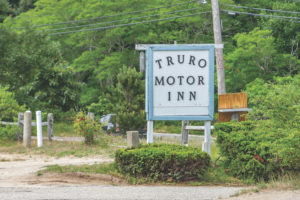
TRURO — Following years of noncompliance with its orders, the board of health took decisive action on June 30 against the owners of the Truro Motor Inn by not renewing their motel license — but it’s the tenants who will pay the immediate price.
An estimated 20 tenants remain in the 36-room motel on Route 6, which was once a cozy hotel but has become a rundown year-round rental for many low-income residents. Until last fall, when the board of health began to press owners Daniel and David Delgizzi to comply with building and septic codes, as many as 50 people, including several children and many immigrants, lived there.
On June 30, the board ended months of legal maneuvers by not renewing the license. That means all the residents must leave and cannot return until the Delgizzis bring their septic and water supply systems up to code.
Because of the temporary state ban on evictions due to the coronavirus, however, none of the tenants will need to actually vacate until that order is lifted, said Peter Van Stratum, a board of health member.
That’s cold comfort for those 20 tenants still occupying rooms. At least the families with children have all found other places to live, said Amy Paine, a tenant who serves as property manager.
The tenants have complained about the town’s enforcement actions, which began in 2019 with threats to shut the place down immediately. Those tenants who were able to leave did.
“Many of the tenants who have moved from the inn only did so out of fear that their applications for U.S. citizenship, or immigrant work visas, could be somehow negatively impacted should they stay at the property,” stated Paul Wundrock, a tenant, in a letter to the board of health. “Still others cited the constant stress of the perpetual meddling of the town, and the stigma of living at a property the town has inaccurately deemed a ‘slum.’ ”
The sad plight of the tenants, who pay over $1,000 a month to live in motel rooms with inadequate electrical service for stoves or microwaves, caused the board of health to back off. Instead, the town went through state land court to place the property in the control of a receiver, who would garnish rent payments and use them to repair the property.
The court process is continuing, just not with a receiver, said Emily Beebe, the town’s health agent.
Instead, the court has asked the Delgizzis for septic and water system plans, which to date have been inadequate, Beebe said. That is why the board did not renew the license. Meanwhile, the board has ordered the Delgizzis to find suitable housing for the remaining tenants.
But just exactly what that means in practical terms, when affordable housing is virtually nonexistent here, is unknown.
Beebe said the matter was still in court and more action would follow; what happens next is up to attorneys and the judge.
Mark Peters, who has been on the Truro Board of Health since 1983, described trying to work with the Delgizzi family, owners of multiple homes, former hotels, and cottages comprising about 80 units total from Provincetown to Orleans.
“It’s a long, long, sordid tale of deferred maintenance and cutting corners and a lack of cooperation,” Peters said.
The Delgizzis own about 60 units in Truro. They own 10 properties in Eastham. Eastham has begun to seize the properties due to the Delgizzis’ failure to pay back taxes.
While the Delgizzis rarely show up for meetings when their own properties are on regulatory board agendas, they attend every hearing to question neighbors’ plans, including recent meetings about the Truro Tradesmen’s Park South, Peters said.
Dina Browne of Walpole, the Delgizzi family’s attorney, did not return calls for comment.
Amy Paine and Paul Wundrock both blame the town for pursuing heartless enforcement tactics, but the board of health members are resolved to hold the Delgizzis accountable for their negligence.
“The fact is they are exploiting a whole group of people who are stuck there,” Peters said.
“Personally, as much as my heart breaks for these people, the board of health is not in the housing business. We’re here to protect public health, and as long as we’re allowing that place to run, we’re not doing that. Those people have a right to live in a safe place and we’re not going to do that by wasting time waiting for the Delgizzis.”



